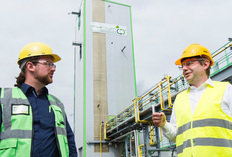- BASF invests €16 million in Pyrum Innovations to expand tire pyrolysis plant.
- Pyrum's plant will add two production lines by end of 2022, processing up to 10,000 tons of tires annually.
- BASF will use the pyrolysis oil for ChemCycling, producing high-quality recycled plastics.
- Life Cycle Assessment shows PA6 from tire pyrolysis oil emits 1.3 tons less CO2 per ton compared to fossil feedstock.

Investment and Expansion
BASF SE is investing €16 million into Pyrum Innovations AG, a company specializing in the pyrolysis of waste tires. This investment will support the expansion of Pyrum’s pyrolysis plant in Dillingen, Germany, and further roll out the technology.
Production Capacity
Pyrum currently operates a pyrolysis plant that processes up to 10,000 tons of end-of-life tires annually. By the end of 2022, two additional production lines will be added to the existing plant. BASF will use most of the pyrolysis oil produced to create new chemical products through its ChemCycling project, primarily serving the plastics industry.
Future Plans
Pyrum plans to build additional tire pyrolysis plants with interested partners, accelerating the use of its technology in serial production. Future investors can be assured that BASF will uptake the pyrolysis oil to produce high-performance chemical products, closing the loop for post-consumer plastic waste.
Environmental Impact
BASF and Pyrum aim to build production capacities of up to 100,000 tons of pyrolysis oil from waste tires in the coming years. A Life Cycle Assessment (LCA) by Sphera shows that products made from pyrolysis oil using a mass balance approach have the same properties as those made from primary fossil resources but with a lower carbon footprint. For example, one ton of PA6 produced with tire pyrolysis oil emits 1.3 tons less CO2 compared to fossil feedstock, due to avoiding tire incineration.

